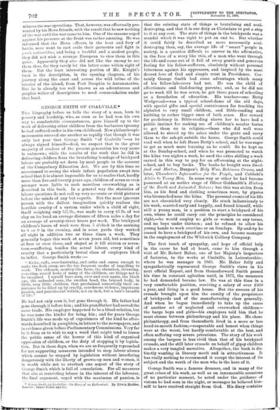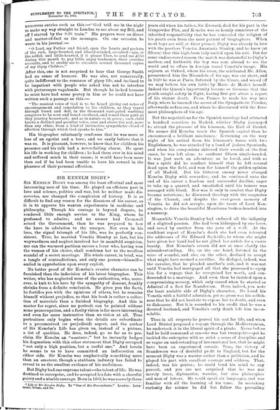GEORGE SMITH OF COALVILLE.*
THE biography before us tells the story of a man, born to poverty and hardship, who, as soon as he had won his own
way to comfortable circumstances, gave himself up to the work of delivering other children from the barbarous tyranny he had suffered under in his own childhood. New philanthropic movements succeed one another so rapidly that though it was only last year that George Smith " of Coalville "—as he always signed himself—died, we suspect that to the great majority of readers of the present generation his very name is unknown ; while the results of the work that he did in delivering children from the brutalising bondage of brickyard labour are probably set down by most people to the account of the Compulsory Education Act. We are by this time so accustomed to seeing the whole infant population swept into school that it is almost impossible for us to realise that, hardly more than five-and-twenty years ago, children of seven or even younger were liable to such merciless overworking as is described in this book. In a general way the statistics of labour questions do not call up very accurate or vivid pictures before the minds of any but experts. But the most ignorant person with the dullest imagination quickly realises the
horrible cruelty of a system under which a child of eight, itself weighing only 521. lb., was made to carry 43 lb. of wet clay on its head an average distance of fifteen miles a day for
an average of seventy-three hours per week. The brickyard children's hours of work were from 5 o'clock in the morning to 8 or 9 in the evening, and in some yards they worked all night in addition two or three times a week. They generally began this work at seven years old, but sometimes at four or even three, and stayed at it till sixteen or seven- teen,—suffering, besides the actual labour, every kind of cruelty that a particularly brutal class of employers liked to inflict. George Smith wrote :-
"Kicks, cuffs, over-hastening, and oaths and curses enough to make the flesh creep, are the too frequent modes of impelling to work. The old-men, monkey-like faces, the shrunken, shivering, cowering, scared looks of many of the children, are things not to be imagined. I myself have seen, over and over again, the black eye, the unhealed sore, the swollen head, the bruised body, in -little, very little children, that proclaimed sorrowfully their ex- perience to be filled up by cruelty, murderous violence, impetuous passion, and punishment within, not an inch, but a hair's breadth of life."
He had not only seen it, but gone through it. His father had gone through it before him ; and his grandfather had served the same trade. His employer happened to be a blood-relation, but he was none the kinder for being kin ; and for years George Smith's life was made up of experiences of the kind he after- wards described in pamphlets, in letters to the newspapers, and in evidence given before Parliamentary Commissions. Very far be it from us to wish to say a word that might tend to lessen the public sense of the horror of this kind of organised oppression of children, or the duty of stopping it by legisla- tion. But in these days, when we are so frequently reproached for not supporting measures intended to stop labour abuses which cannot be stopped by legislation without interfering dangerously with the liberty of grown-up men and women, it is worth while not to overlook one aspect of the story of George Smith which is full of consolation. For all measures that aim at restricting labour in the interest of the labourer, the final argument, urged with the maximum of passion, is
• George Smith (of Coalville): the Story of an Enthusiast. By Edwin Hodder. London: James Nisbet and Co. that the existing state of things is brutalising and soul- destroying, and that it is our duty as Christians to put a stop to it at any cost. The state of things in the brickyards was a scandal which it was right to put an end to. But whether it could fairly be described as more necessarily soul. destroying than, say, the average life of " smart" people in society, is a question difficult to answer in the affirmative, in the face of a story like this, of a man who went through the life and came out of it full of every gentle and generous feeling for his fellow-sufferers, absolutely without personal bitterness against his oppressors, and inspired by the most devout love of God and simple trust in Providence. Cer- tainly George Smith had some advantages which many of his fellow-labourers had not. He was the child of affectionate and God-fearing parents ; and, as he did not go to work till he was seven, he got three years of schooling as a foundation of education. His teacher—one Betty Wedgwood—was a typical school dame of the old days, with special gifts and special contrivances for teaching the alphabet to very small children, and Bible-reading and knitting to rather bigger ones of both sexes. Her reward for proficiency in Bible-reading shows her to have had a politic instinct for making use of children's secular tastes to get them on in religion,—those who did well were allowed to shovel up the ashes under the grate and carry them to the ash-pit outside the house. George Smith could read well when he left Dame Betty's school, and he was eager to get as much more learning as he could. So he kept on at the Sunday-school, and when he was promoted to watch the kilns two nights a week, he used the extra shilling a week earned in this way to pay for an off-evening at the night- school, and to buy books. The books he bought were Sand- ford and Merton, Bunyan's Holy War, Robinson Crusoe, and later, Chambers's Information, for the People, and Cobbett's Advice to Young Men. In some way or other he had become possessed at an earlier stage of Oliver Goldsmith's History of the Earth and Animated Nature; but this was stolen from him, as his food and clothing sometimes were, by gipsies who bivouacked near the kilns. The personal events of his life are not chronicled very closely. He stuck industriously to his work, married early and happily, and found himself, while still a young man, in a position to start a brickyard of his own, where he could carry out the principles he considered right,—he would employ no girls or women on any terms, and no boys under thirteen ; and he refused to allow his young hands to work overtime or on Sundays. By-and-by he ceased to have a brickyard of his own, and became manager in the employment of the Whitwick Colliery Company.
The first touch of sympathy, and hope of official help in the cause he had at heart, came to him through a visit of Mr. Robert Baker, one of her Majesty's inspectors of factories, to the works at Coalville, in Leicestershire, where he was manager in 1863. Mr. Baker fully and sympathetically represented George Smith's views in his next official Report, and from thenceforward Smith passed his time in constant agitation until, in 1871, the measures he had demanded became law. He was at this time in a very comfortable position, receiving a salary of over £400 a year, and living in a good house. But the success of his crusade brought upon him the enmity of the proprietors of brickyards and of the manufacturing class generally. And when he began immediately to take up the cause of another set of neglected and overworked children— the barge boys and girls—his employers told him that he must choose between philanthropy and his place. He chose philanthropy, and from thenceforth lived in a more or less hand-to-mouth fashion,—respectable and honest when things were at the worst, but hardly comfortable at the best, and often suffering very severe privations. The story of his work among the bargees is less vivid than that of his brickyard crusade, and the still later crusade on behalf of gipsy children makes a very tangled narrative. Altogether, the book is dis- tinctly wanting in literary merit and in attractiveness. It has really nothing to recommend it except the interest of its subject and the worth of the man who is the hero of it.
George Smith was a famous dreamer, and in many of the great crises of his work, as well as on innumerable occasions of no particular moment, he acted under the guidance of visions he had seen in the night, or messages he believed him- self to have received straight from God. His diary contains numerous entries such as this :—" God told me in the night
to make my way straight to London to see about my Bill, and a I started by the 8.30 train." His prayers were as direct
and matter-of-fact as the messages. On one occasion he wrote in his journal :—
" 0 Lord, my Father and friend, open the hearts and pockets of the rich, large-hearted, and liberal-minded, so-called—aye, or the selfish and little-hearted, if it please Thee, to send me £150 during this month to pay little angry tradesmen their overdue amounts, and to enable me to circulate several thousand copies of my Gipsy Children."
After this, one is not surprised to hear that George Smith had no sense of humour. He was also, not unnaturally, quite indifferent to the romance of gipsy life, and inclined to be impatient with people who asked him not to interfere with picturesque vagabonds. But though he lacked humour he must have had some poetry in him or he could not have written such a passage as this :—
" The musical voice of God is to be heard giving out notes of encouragement and consolation to his children, as they travel through forest and dell, in the thousand variegated warbling songsters to be seen and heard overhead, and round their path as they journey homeward; and as in nature so in grace ; each child knows a distinct and peculiar voice, over and above the rest, more than any other, from a kind of instinctive sympathetic chord of affection through which God speaks to him."
His biographer reluctantly confesses that be was more or less of an egotist and a bore; and we easily believe that it was so. It is pleasant, however, to know that for children his presence and his talk had a never-failing charm. He spent his life in working for children ; he had them ever in his mind and suffered much in their cause ; it would have been more than sad if he had been unable to have his reward in the pleasure of their personal affection.























































 Previous page
Previous page